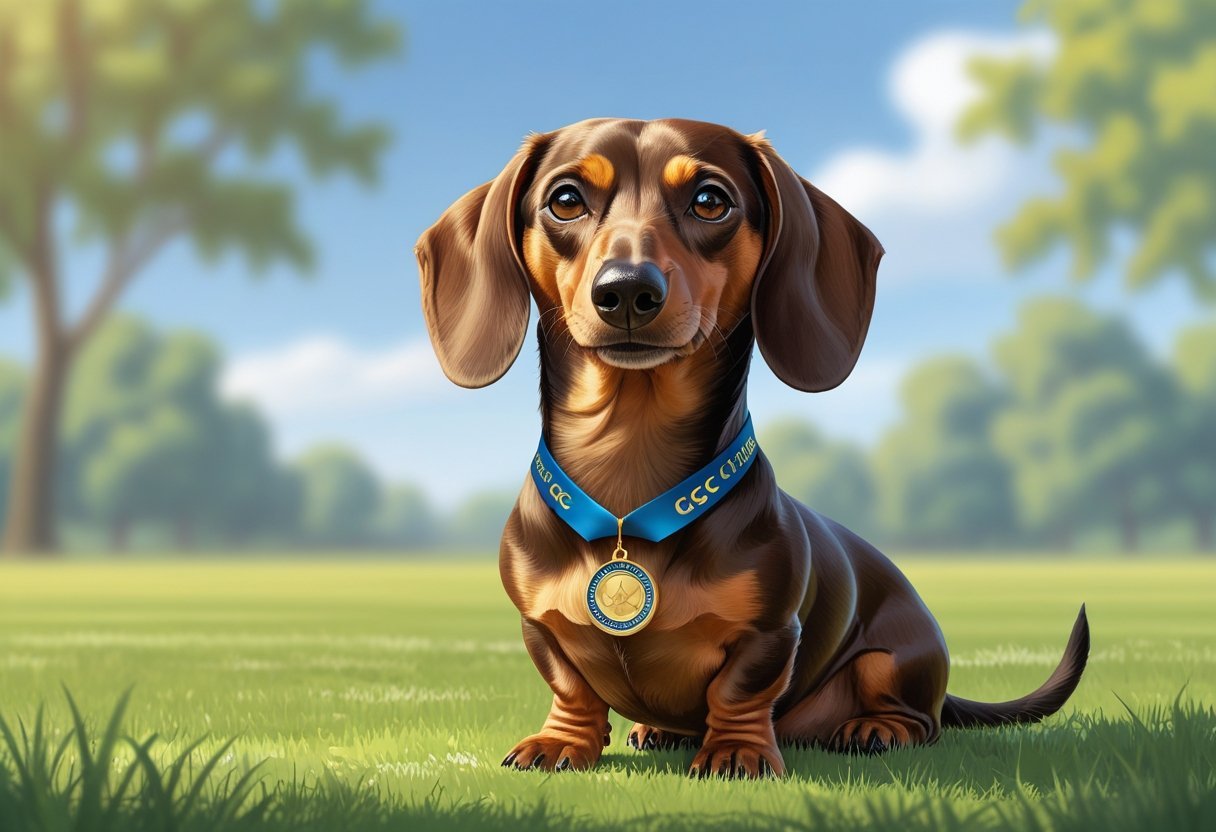Dachshunds might be small, but with some guidance, they can earn a Canine Good Citizen (CGC) title just like the big guys 🐾. Any dachshund can reach the CGC award by learning key skills and practicing good manners out in the real world 🌎. A canine good citizen dachshund shows excellent manners in public 🎉.
This recognition means your dachshund is well-behaved, friendly, and ready for all sorts of social situations 🤝.
People sometimes wonder if their dachshund’s quirky traits will make things tougher 🤔. With patience and the right steps, dachshunds can meet the same standards as any breed when working toward the CGC title ✅.
Plenty of owners discover the training process actually builds a stronger bond, too ❤️.
Key Takeaways ✨
- Dachshunds can earn the Canine Good Citizen title with the right training. 🐕
- Understanding dachshund behaviors helps make CGC training smoother. 📘
- Clear steps and patience lead to CGC success and new training opportunities. 🌟
🐾 Free Dachshund Care Guide
Download our free checklist to ensure your Dachshund stays happy, healthy, and well-loved!
Get Your Free Guide 🐶Understanding the Canine Good Citizen Title
The Canine Good Citizen (CGC) title is a test for dogs that shows good manners, obedience, and safety in public 🐾. Dachshunds and other small breeds can achieve this with the right training and preparation 🎯.
What Is the CGC Program? 🏅
The CGC program, run by the American Kennel Club (AKC), lists ten skills dogs need to show 📋. These include sitting politely for petting, walking on a loose leash, and reacting calmly to distractions 🚶♂️🐕.
Owners sign a pledge to be responsible for their dog’s care and training ✍️. Dogs get tested in everyday situations, not just in a classroom 🏞️.
Some rules for the test are:
- Dogs can’t show aggression. 🚫
- Only positive reinforcement is allowed. 👍
- Flat collars or harnesses are fine. 🐕
Getting a CGC certificate gives owners proof of their dog’s good behavior 📜.
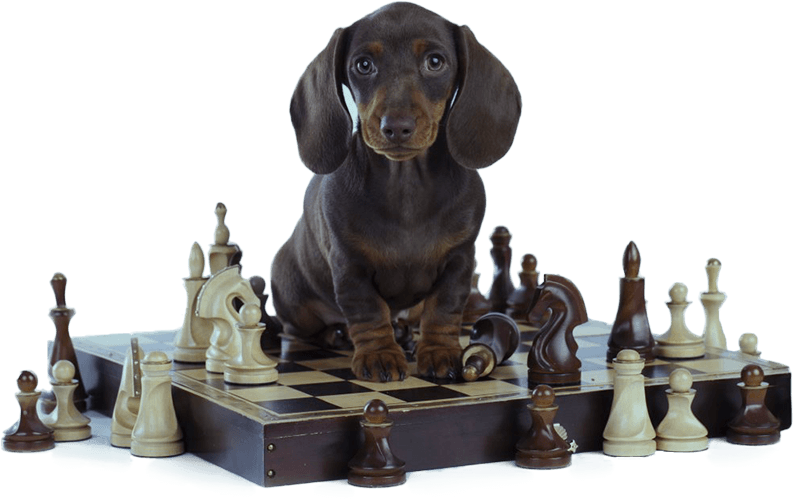
🧠 Brain Training for Dogs – Build Focus & Manners for CGC
Short, game-based lessons that strengthen impulse control, recall, and calm behavior—ideal for a Canine Good Citizen Dachshund.
- Fun, bite-size sessions keep your Doxie engaged and responsive ✅
- Reduces barking and reactivity around everyday distractions 🌿
- Step-by-step path from basics to public-manners success 🎯
Importance for Small Breeds 🐶
People often think the CGC is just for big dogs, but it matters for small breeds like Dachshunds, too 💡. Small dogs sometimes get overlooked when it comes to basic obedience and manners 🐾.
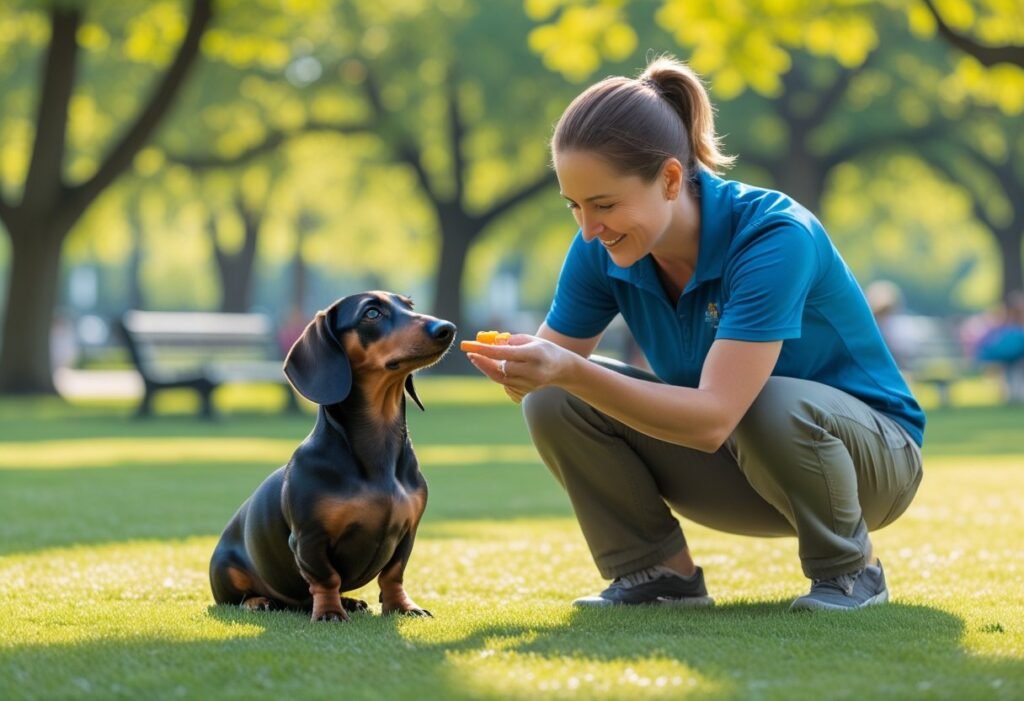
A well-trained little dog is easier to take places, whether it’s the park or a pet-friendly store 🛍️. The CGC for small dogs also helps show that little breeds can be just as polite and reliable as the big ones ⭐.
Proper training gives small dogs confidence and helps prevent unwanted behaviors like barking or jumping 🐕🦺. CGC training is also handy for Dachshund owners who want their dogs to interact nicely with others 🤝.
Benefits for Dachshund Owners 🐾
Dachshund owners benefit from the CGC in a bunch of ways 🌟. Dachshunds have strong personalities and can be stubborn, so CGC training helps set clear boundaries and improves listening skills 🎓.
Having a Canine Good Citizen Dachshund makes travel, walks, and public outings much easier 🚗🏞️. It can also help when renting an apartment or joining community events since some places require dogs to have the CGC title 🏠.
CGC training can be a step toward therapy dog work or advanced sports 🐕⚕️. For Dachshund owners, it means having a happy, relaxed, and manageable pet in many different situations ❤️.
Unique Characteristics of Dachshunds in CGC Training
Dachshunds have distinct behavioral and temperament traits that can affect their success in Canine Good Citizen (CGC) training 🐾. Training strategies often need to be adjusted for their unique needs 🎯.
Temperament and Behavioral Traits 🐶
Dachshunds are intelligent, alert, and sometimes stubborn 🧠. They were originally bred for hunting badgers, so they’re bold and independent 💪.
This independence can make them less eager to follow commands, especially if they’re distracted 🙃. They tend to form strong bonds with their owners, which often makes them loyal and willing to please during CGC exercises ❤️.
Their alert nature may lead to barking at strangers or new situations 🔔. Socializing early can help Dachshunds stay calm and confident around new people 🤝.
Key behaviors to keep in mind:
- Strong prey drive (may chase small animals) 🐇
- Vocal tendencies (barking when anxious or excited) 🎤
- Loyalty to owner (often looking for approval) 💕
- Sensitivity to harsh corrections (respond better to positive reinforcement) 👍

🌿 Wild Earth Complete Plant-Based Food
- Gentle, consistent nutrition that supports calm CGC practice 🙂
- Plant-based recipe helps avoid surprise tummy upsets during training 🌱
- Easy to portion so energy stays steady before sessions 🎯

⏱️ Petlibro Auto Feeder
- Scheduled meals keep routines predictable for training 😌
- Portion control supports healthy weight and steady focus ⚖️
- Great for busy owners—stay consistent without stress 📅
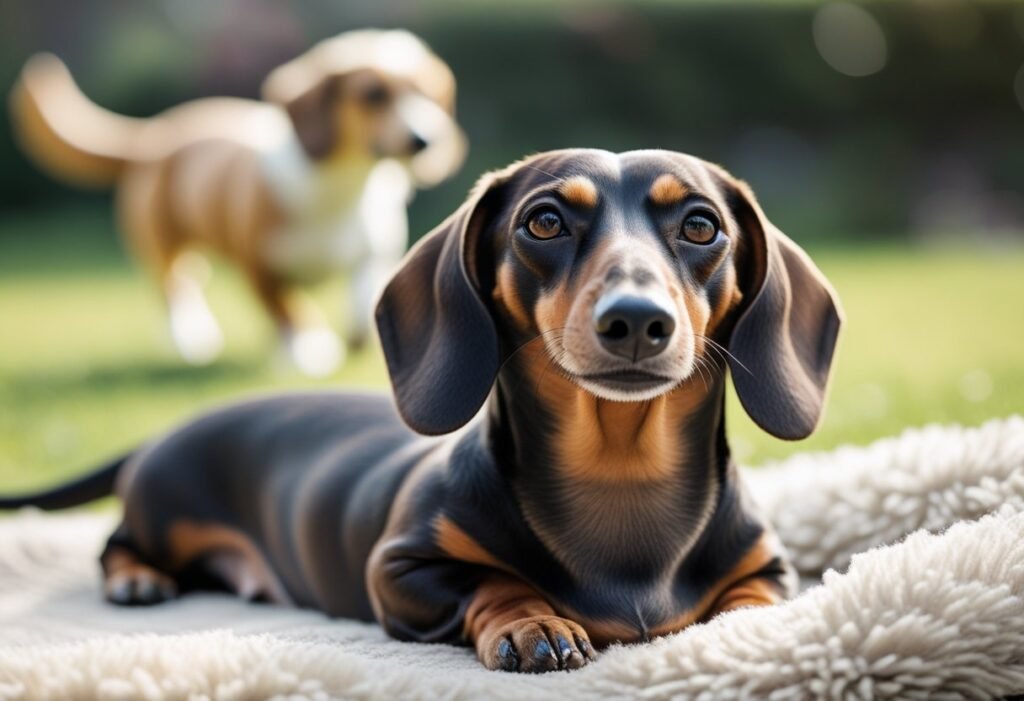
Challenges and Opportunities 🌟
Training a Dachshund for the Canine Good Citizen title brings unique challenges 🐕. Their stubborn streak can make repetitive commands less effective, so patience and short, positive sessions are usually needed 🕒.
One common challenge is their tendency to bark 📢. They might react strongly to new people or dogs, making some CGC test items tricky 🚧. Consistent, calm exposure to new situations helps reduce this behavior 🌿.
Dachshunds have an advantage, though—they’re highly food-motivated 🍪. Treats and praise motivate them to respond well in obedience exercises 👏.
With commitment, their loyalty and intelligence help them master CGC skills 🏆.
Training adaptations for Dachshunds:
| Challenge | Adaptation |
|---|---|
| Stubbornness | Keep sessions short and positive 🙂 |
| Barking | Train with calm introductions 🌱 |
| Sensitivity | Use gentle, reward-based methods 🥰 |
Step-by-Step Guide to CGC Training for Dachshunds
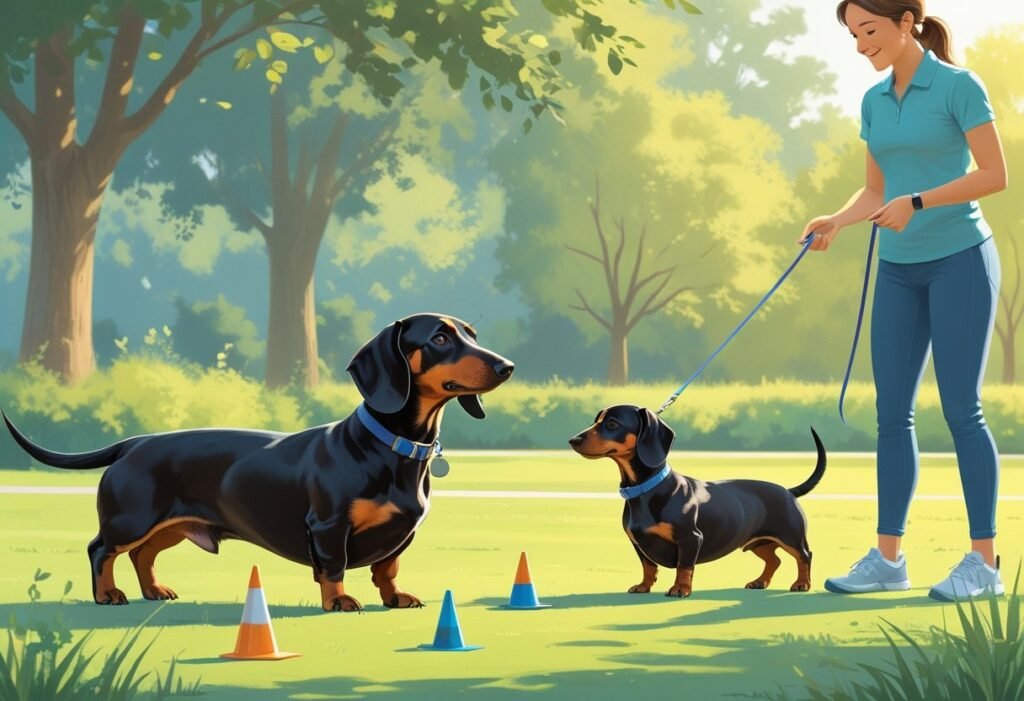
Dachshunds can become canine good citizens with focused training and practice 🐾. Training sessions should cover preparation, key obedience skills, social manners, and readiness for the testing environment 🎯.
Preparing Your Dachshund for Assessment 📝
Getting a dachshund ready for the Canine Good Citizen (CGC) test starts with daily routines and a safe environment 🏡. Regular walks and social outings help build their confidence 🌳.
Praise and food rewards encourage learning and keep training positive 🍪. Owners should help their dachshunds get comfortable around new people, loud sounds, and other animals 👥.
Gently handling ears, paws, and tails prepares them for the CGC assessment, where testers will examine the dog 🐶. Short, consistent training sessions—about 10 minutes each—work best for dachshunds ⏱️.
End each session on a good note and avoid pushing too hard 🌟. Keeping training fun and calm helps your dog want to learn 💕.

Obedience Skills Required 🎓
The CGC test covers specific obedience tasks every Dachshund should know:
- Sit and Down: The dog should respond to commands quickly. 🐕
- Stay: Dachshunds need to remain in position until released. ⏳
- Come: The dog must return when called from a short distance. 🏃♂️
- Walking Politely: Heeling without pulling or lagging is critical. 🚶
Practicing these commands daily builds reliability 🔄. The advanced Doxie training method rewards calm, focused behavior over excitement 🌿.
Use a leash and simple voice commands, since treats may not be allowed during the test itself 🚫🍖. Dogs should get used to different environments so they perform well no matter where the test takes place 🌍.

🍳 ChefPaw Fresh Dog Food Maker
- Customize gentle, plant-forward recipes to avoid diet surprises 🌿
- Batch-cook portions so pre-CGC routines stay simple 📦
- Know exactly what fuels your Dachshund’s focus ✅

🗂️ The Swiftest – Pet Insurance Comparison Tool
- Compare plans quickly so you can focus on training 🧭
- Check Dachshund-friendly coverage and IVDD considerations 🔍
- Choose smart protection for CGC classes and events 🏷️
Socialization and Public Behavior 🤝
Proper socialization is essential for any canine good citizen Dachshund 🌟. Dogs need regular exposure to strangers, both adults and children, and other dogs—friendly interactions on and off a leash 👨👩👧👦🐾.
Take them to parks, pet stores, and busy streets 🛒. Controlled greetings help teach polite behavior ✅.
The Dachshund shouldn’t jump, bark, or act shy when approached 🚫🐕. Practice calm, neutral reactions to passing bicycles or joggers, since these might pop up during the test 🚴.
| Socialization Skills | Goal |
|---|---|
| Meeting strangers | Remain calm, friendly 🙂 |
| Being around dogs | Show good manners 🐕 |
| New environments | Stay focused, relaxed 🌿 |
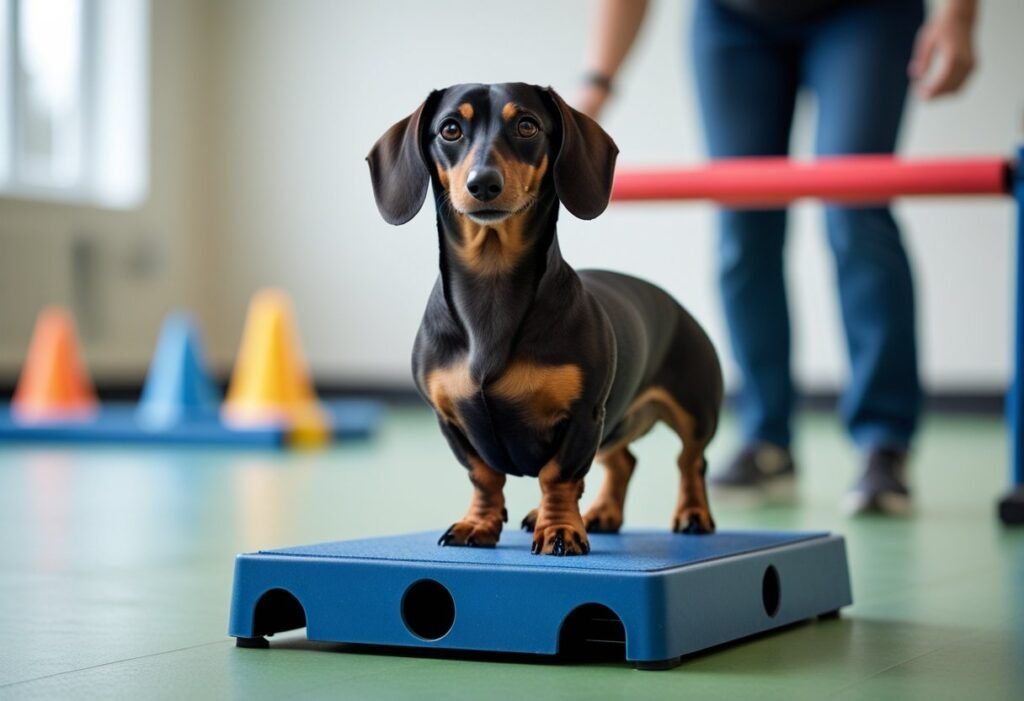
🎉 Grab your free Dachshund care checklist!
Testing Environment and Expectations 🏆
The CGC test happens in a public place with distractions 🏞️. Dogs are tested on leash with their owners using only a flat collar or harness 🎽.
No food, toys, or corrections like choke chains are allowed 🚫. Each part of the test is handled by a certified evaluator 👩⚖️.
The dog is asked to perform tasks in sequence, like meeting a friendly stranger or walking through a crowd 👋. Dachshunds might get nervous, so owners should stay calm and confident 💪.
A pre-visit to the test location can reduce surprises and stress 🗺️. Practice with mild distractions to build up your dog’s trust and focus ✨.
To pass, your dog needs to stay steady and well-behaved in this real-life setting 🐾. Observers should see a dog that’s under control, friendly, and stable at all times 🌟.
Essential Skills for CGC Success With Small Dogs
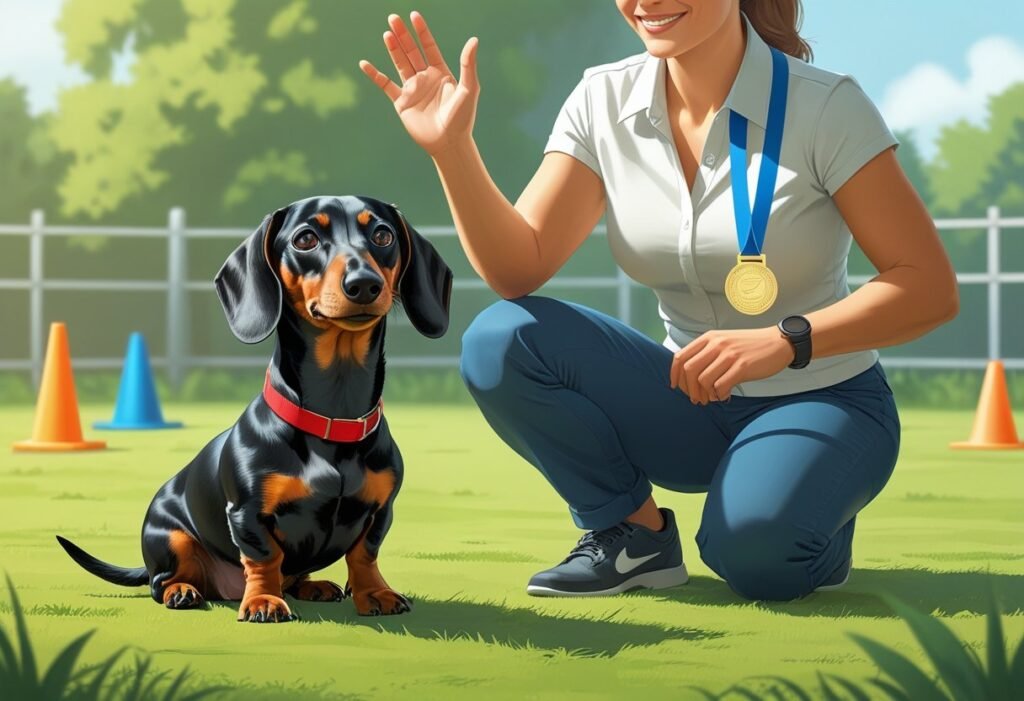
Small dogs like Dachshunds can earn the Canine Good Citizen (CGC) title with the right skills and practice 🐾. Owners need to focus on safe handling and calm reactions to distractions 🌟.
Handling Leash Manners 🚶♂️
Dachshunds and other small breeds pull or lag behind on walks, usually because they’re curious or just tiny 🐕. Building good leash manners makes walks easier and safer ✅.
Use a harness that fits well and doesn’t rub or press on your dog’s neck 🎽. It’s just more comfortable for both of you 💕.
Key tips for leash training with small dogs:
- Practice walking at your pace 🐾
- Use treats or cues to grab their focus 🍪
- Stop moving if your dog pulls ahead or wanders 🚫
- Reward your dog for sticking by your side or walking behind you 🎉
Stay consistent so your dog knows what you want 🔄. In the CGC test, your dog needs to keep a loose leash even around distractions like people or other animals 👥.
For small breeds, teaching “heel” or “leave it” gives you more control ⚡. It’s worth practicing these commands regularly 📘.

🛏️ Majestic Pet Orthopedic Bed
- Orthopedic support for long backs aids recovery and comfort ✔️
- Bolstered edges create a secure, relaxing space 😌
- Easy to clean—ideal for daily training routines 🧼
📍 Tractive GPS Dog Tracker
- Live tracking for safe recall practice and outings 🧭
- Set safe zones and get instant alerts if your Doxie wanders 🚪
- Waterproof and adventure-ready for parks and classes 💧
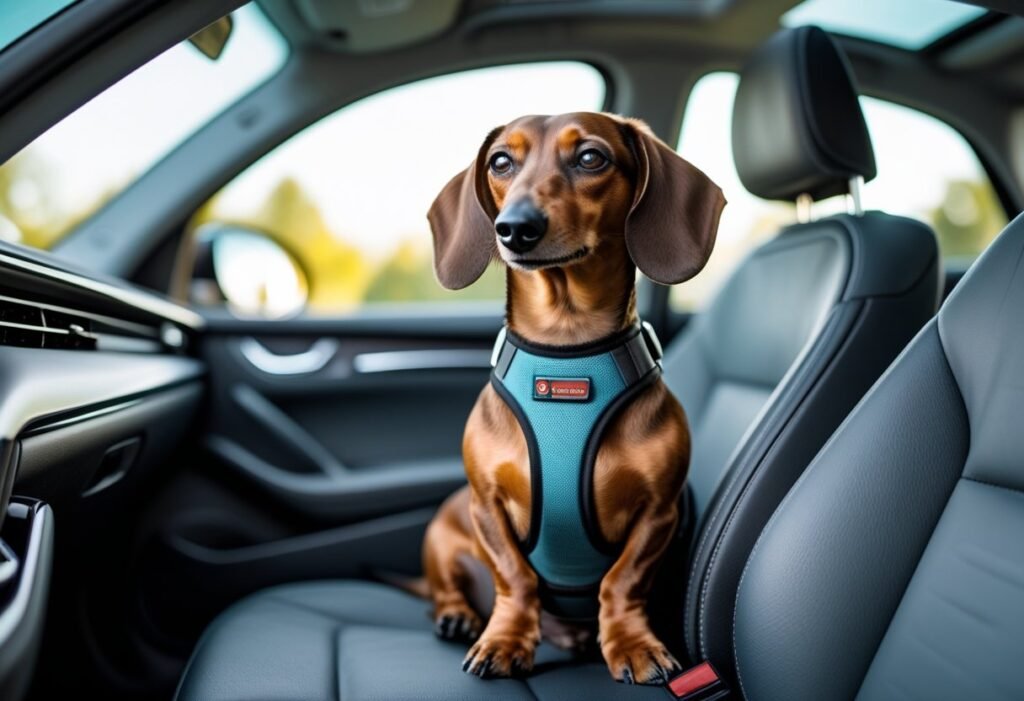
Reaction to Distractions 🔔
Small dogs get startled by loud noises, fast movement, or unfamiliar people 😯. The CGC test checks that your dog doesn’t overreact when facing common distractions 🏆.
Expose your pup to everyday sights and sounds in a calm setting 🌳. Don’t rush it—slow and steady works best ⏳.
Effective strategies to prepare include:
- Gradually introduce your dog to vacuum cleaners, bicycles, or busy streets 🚴
- Use reward-based training for calm behavior 👍
- Practice ignoring other dogs during walks 🐶
- Stay upbeat and relaxed while training 😊
Let your Dachshund build confidence with patient, regular practice 🌿. If your dog gets scared, avoid picking them up, since that can make anxiety worse 🚫.
Common Mistakes and How to Overcome Them
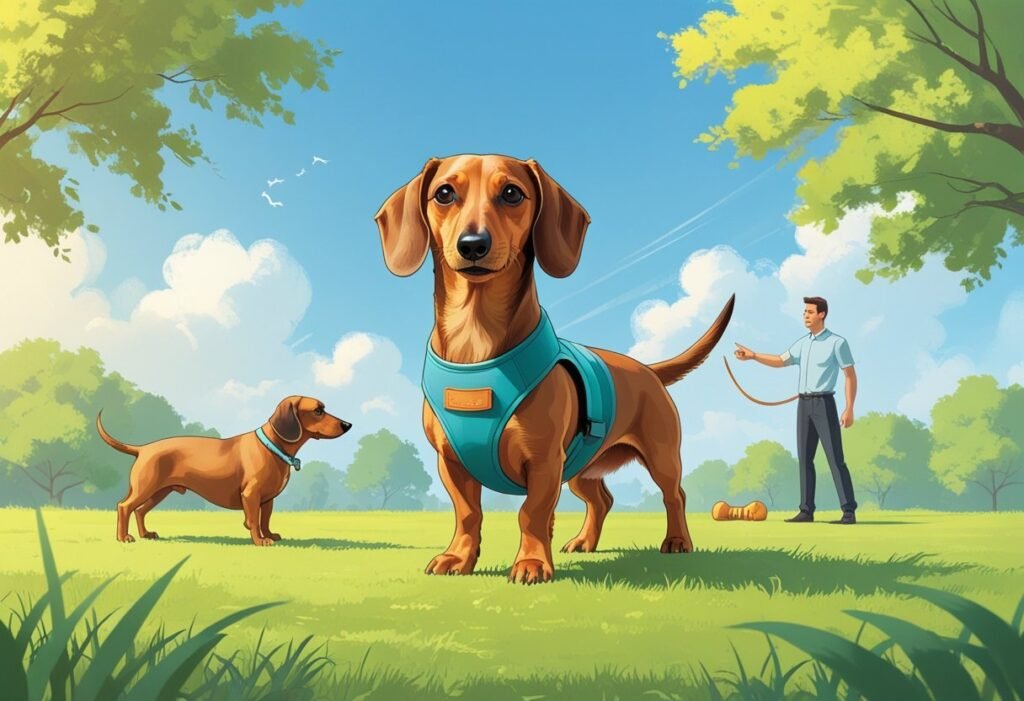
Many Dachshunds run into common problems during advanced Doxie training 🐾. Stubbornness and trouble paying attention can make earning the Canine Good Citizen (CGC) title a bit tricky, but you can absolutely manage these with the right approach 💡.
Addressing Stubborn Behaviors 💪
Dachshunds definitely have an independent streak 😅. Sometimes they just decide not to listen.
Consistency matters 🔄. Short, regular training sessions work way better than dragging things out ⏱️.
Keep motivation high with small treats or a favorite toy 🍪🎾. Set clear, simple rules and stick to them every time 📘.
Avoid yelling or harsh corrections—they just make a Dachshund dig in their heels 🚫. If your dog ignores a command, repeat it calmly and show them what you want ✅.
Checklists help with tough commands. For example:
| Command | Typical Problem | Solution |
|---|---|---|
| “Sit” | Won’t follow hand signal | Use a treat as a lure 🍪 |
| “Stay” | Breaks position early | Reduce distance, reward often 🎉 |
| “Come” | Ignores recall | Use long lead, higher value treats 🦴 |

🔬 AnimalBiome Gut Health Test Kit
- Identify imbalances that can affect behavior and focus 🧠
- Actionable recommendations to support training routines 📋
- Great for sensitive Dachshunds prone to tummy issues 🌿

😌 Zomalka Anxiety Relief Drops
- Natural support for calm behavior during CGC exercises 🌿
- Helps with noise sensitivity and new environments 🔔
- Use with short, positive training sessions for best results ✅
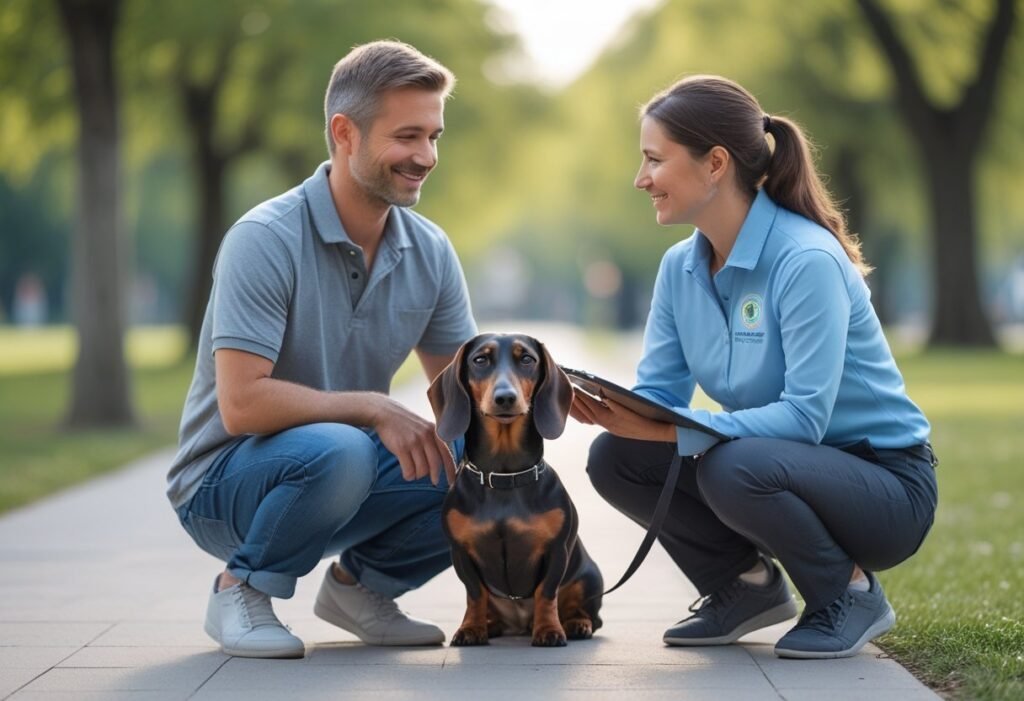
Maintaining Focus During Training 🎯
Distractions are everywhere, and Dachshunds are curious little explorers 🔍. Sounds, smells, or movement can quickly pull their attention away 👂👃👀.
Start training in a quiet place, then slowly add distractions 🌿. Keep sessions very short—five to ten minutes is usually enough for their attention span ⏳.
If your dog zones out, give them a quick break or play a fun game for a couple of minutes 🎾. Use high-value treats or toys that only come out during training to keep things interesting ⭐.
Practice the same command in different places so your Dachshund learns to listen anywhere 🌍. If you need a simple schedule, try this:
- 5 minutes: review basics (sit, stay, come) 🐕
- 3 minutes: practice with mild distractions (TV on, another person walking by) 📺
- 2 minutes: end with praise and play 🎉
Mixing up the routine keeps training fresh and your Dachshund engaged 💕.
Post-CGC: Advanced Training and Activities
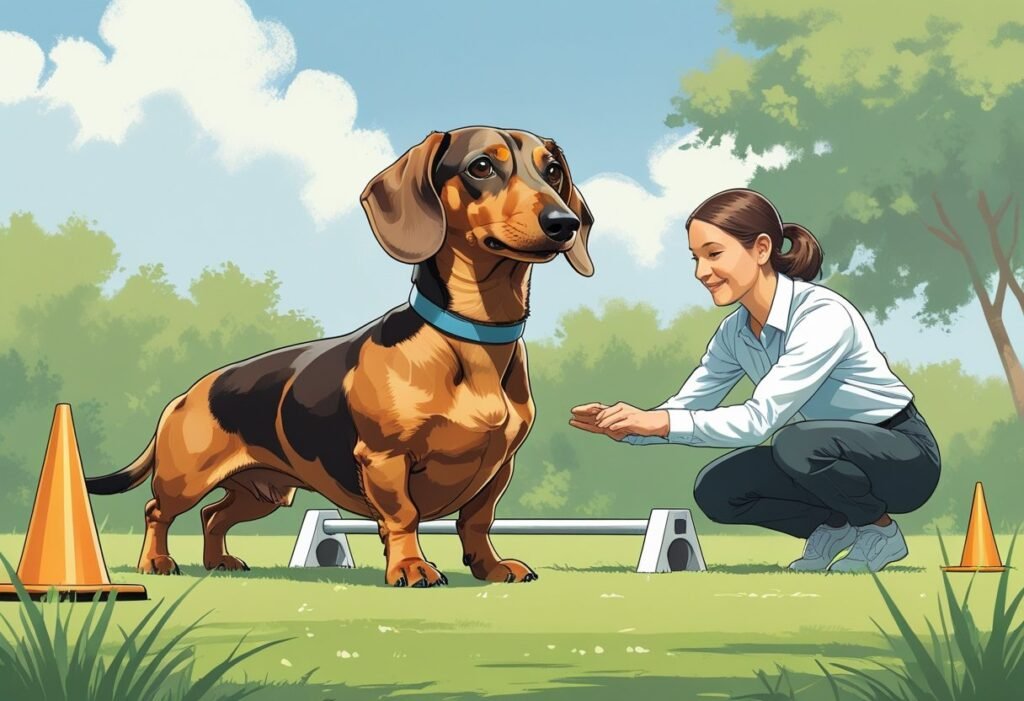
Once your Dachshund earns a Canine Good Citizen (CGC) title, it’s smart to keep up their training 🐾. This keeps their minds and bodies active 💡. A lot of owners jump into advanced Doxie training or explore new activities together 🎯.
Building on CGC Foundation 🏅
Dachshunds with a CGC title already know the basics: sit, stay, come when called ✅. The next step? Try for Canine Good Citizen Advanced (CGCA) or CGC Urban (CGCU) tests 📘.
These add public manners and loose-leash walking in busy places 🚶♂️. You’ll also work on focus with more distractions 🔔.
Training might include:
- Long down-stays with distractions 💤
- Reliable off-leash recalls 🐕
- Extended socialization with people and dogs 🤝
- Navigating elevators, shopping carts, and crowds 🛒
Keep sessions short and positive—treats and praise go a long way 🍪👏. If you’re stuck, joining an obedience class or finding a professional trainer can really help 🎓.
🎯 CGC Training Helpers for Your Dachshund’s Success
- 💧 Petlibro Water Fountain — Consistent hydration keeps your Dachshund alert and energized for CGC practice.
- 📹 Petcube Cam 360 — Monitor your Doxie’s manners when alone and reinforce calm, CGC-worthy behavior.
- 🍖 Petcube Bites 2 — Reward calm behavior remotely with treats and keep positive reinforcement consistent.
- 🪜 Majestic Pet Stairs — Protect your Dachshund’s back during daily routines while maintaining smooth, confident movements.
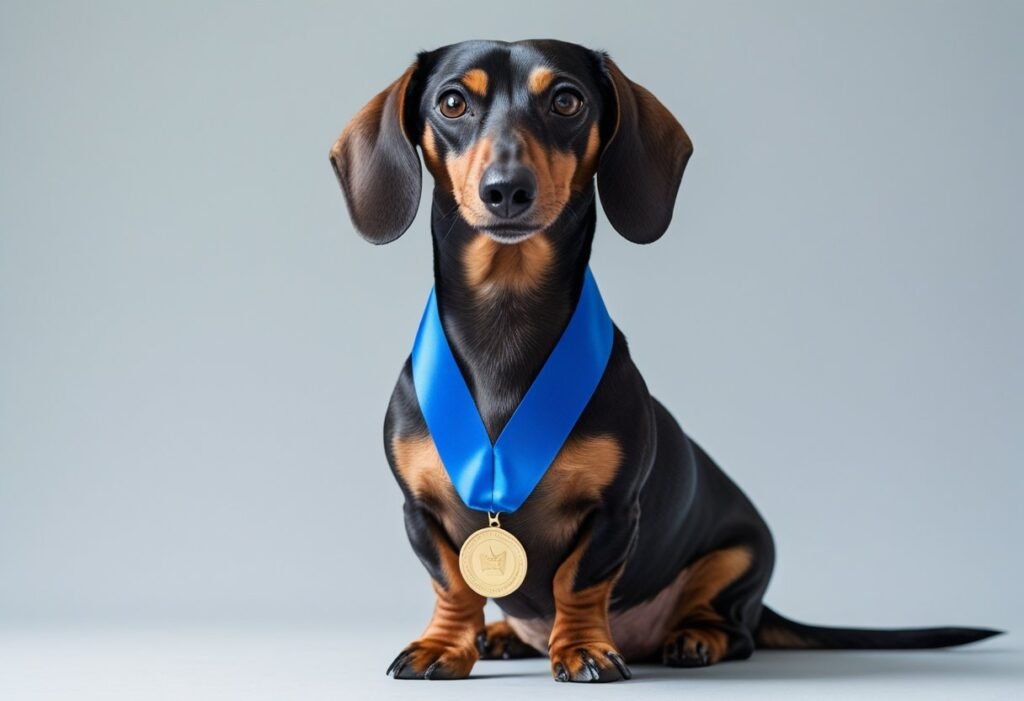
Exploring Therapy and Sports Options 🌟
Some Dachshunds thrive as therapy dogs 🐕🦺. With a CGC title, they can start therapy training and visit hospitals, schools, or care homes 🏥. Therapy work takes a calm, gentle temperament and strong obedience skills ❤️.
If your Doxie’s more of an athlete, sports like agility, rally obedience, and nose work are awesome 🏃♂️. These activities:
- Build confidence and teamwork 🌟
- Give mental and physical stimulation 🧠💪
- Help prevent unwanted behaviors 🚫
Agility courses can be adjusted for short legs 🏆. Rally obedience encourages quick thinking ⚡. Dachshunds often excel at scent detection games thanks to their powerful noses 👃.
Joining local dog clubs gives your Doxie a chance to practice and make friends 🐾. It’s fun for both of you, honestly 😊.
Celebrating CGC Achievement and Community Involvement
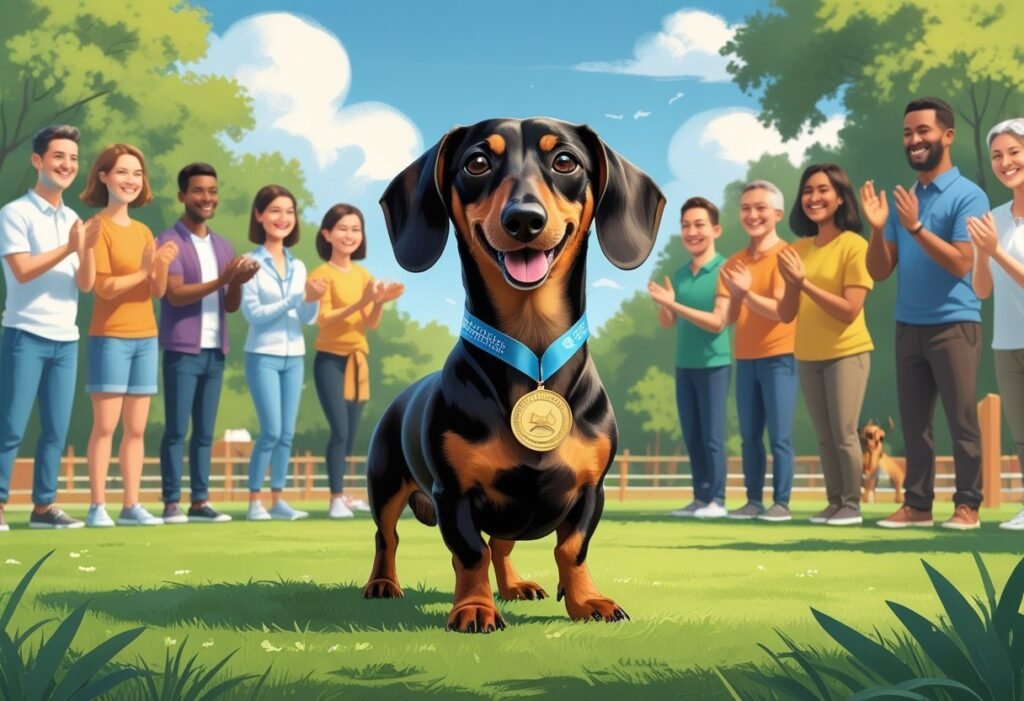
When a Dachshund earns a Canine Good Citizen (CGC) title, it’s a proud moment 🎉. It’s also a great way to connect with the local dog community and inspire others 🐾.
Sharing Success Stories 📸
Sharing your Dachshund’s journey to the CGC title can encourage other pet owners 💡. These stories show the dedication, daily routines, and creative problem-solving involved 📝.
Photos or short videos help show your dog’s progress 📷. Posting updates on social media, dog forums, or local newsletters spreads positivity and real-world tips 🌟.
Some organizations, like the American Kennel Club (AKC), welcome CGC stories for their websites 🏅. Submitting your Dachshund’s experience might even inspire new trainers 🚀.
💛 Confidence-Building Essentials for CGC Training
- 🎽 Embark Pet Adventure Harness – Secure, comfortable fit that supports focus and calm leash manners during CGC practice
- 🧴 Pride + Groom Grooming Tools Kit – Keep your Dachshund looking polished and feeling their best for test-day presentation
- 🌿 Innovet PurCBD Oil – Natural calm support to ease nerves before evaluations or busy training sessions
- 🎨 Purr & Mutt Personalized Dachshund Art – Celebrate your CGC journey with custom art that captures your pup’s personality
- 👕 Dog is Good Apparel & Gifts – Show off your Dachshund pride with positive, dog-lover energy that inspires every training day
🐾 Train with confidence, calm, and connection—your Dachshund’s CGC success starts with the right mindset and tools.
Connecting With Other CGC Dachshund Owners 🤝
Connecting with other CGC Dachshund owners gives you support and fresh ideas 💬. Local training clubs, breed groups, or CGC-focused social pages are good places to start 📘.
Group park walks and training sessions let well-mannered Dachshunds practice their skills and socialize 🌳. It’s nice for the humans, too 😊.
Here are a few ways to connect:
| Method | Description |
|---|---|
| Training Clubs | Meet up regularly for activities 🐕 |
| Online Groups | Share advice and tips virtually 💻 |
| Community Events | Participate in CGC meetups 🎪 |
These connections often turn into lasting friendships—for both you and your dog ❤️.
🐾 Don’t Miss Out!
Download our free Dachshund care guide to keep your furry friend happy and healthy.
Get Your Free Guide 🐶Frequently Asked Questions
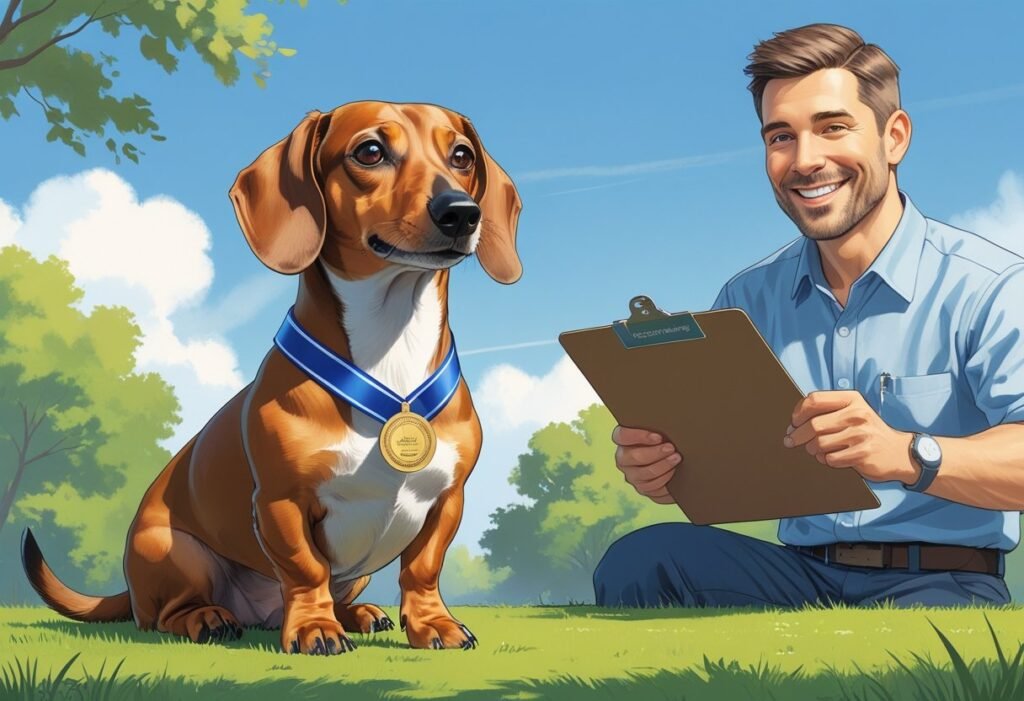
Owners usually want to know how to prep a Dachshund for the Canine Good Citizen (CGC) title, what the benefits are, and how to find a solid training program ❓. Other common questions cover eligibility, therapy work, and what kind of documentation you get 📜.
What are the steps to prepare my Dachshund for the Canine Good Citizen test? 🐾
Start with basic commands: sit, stay, come, and heel 🎓. Socialize your Dachshund with people and other dogs early on 🤝.
Practice handling skills like grooming, walking on a loose leash, and polite greetings ✨. Group classes help with distractions and build confidence 🏅.
How can I find reputable Canine Good Citizen training programs for my dog? 📘
Most local dog training centers offer CGC prep classes 🐕. Look for trainers certified by the American Kennel Club (AKC) or ones experienced with Dachshunds 🎯.
Check the AKC website or ask your vet for recommendations 💡. That usually steers you right ✅.
What specific benefits does passing the Canine Good Citizen test provide for my pet? 🌟
A Dachshund with a CGC title proves they have good manners around people and other dogs 🐶. Some landlords and insurance companies see the CGC as proof of a well-behaved dog 🏠.
Passing the test can open doors to advanced training or therapy work, too 🚀.
What criteria must a dog meet to be eligible for the Canine Good Citizen program? 📋
Your dog needs to be friendly, healthy, and at least six months old 🎂. There aren’t any breed restrictions for the CGC program 🌍.
Dogs don’t have to be AKC-registered to take the test—mixed breeds are welcome 💕.
What are the implications of having a CGC title for my Dachshund in terms of therapy work? 🐕🦺
Most therapy dog organizations require a CGC certificate before training starts 🏥. A Dachshund with a CGC title usually has an easier time becoming a certified therapy dog, since it shows they have solid obedience and good behavior 🌟.
What kind of documentation or proof is provided upon completion of the Canine Good Citizen certification? 🏆
After your dog passes the test, you’ll get an official CGC certificate from the American Kennel Club 📜. They’ll send it straight to you—pretty satisfying, honestly 😊.
If your dog’s got AKC records, you can even add a CGC title to their file 📂. Some places toss in a CGC tag for your dog’s collar, which is a nice little touch 🐾.

